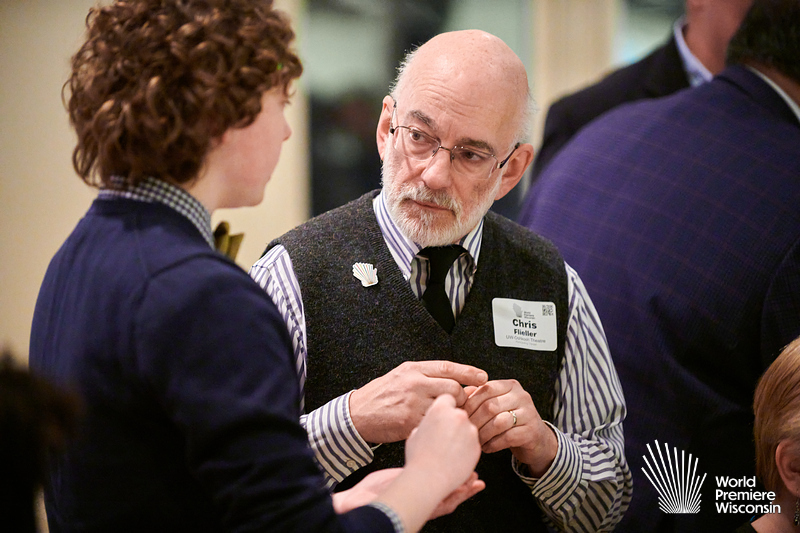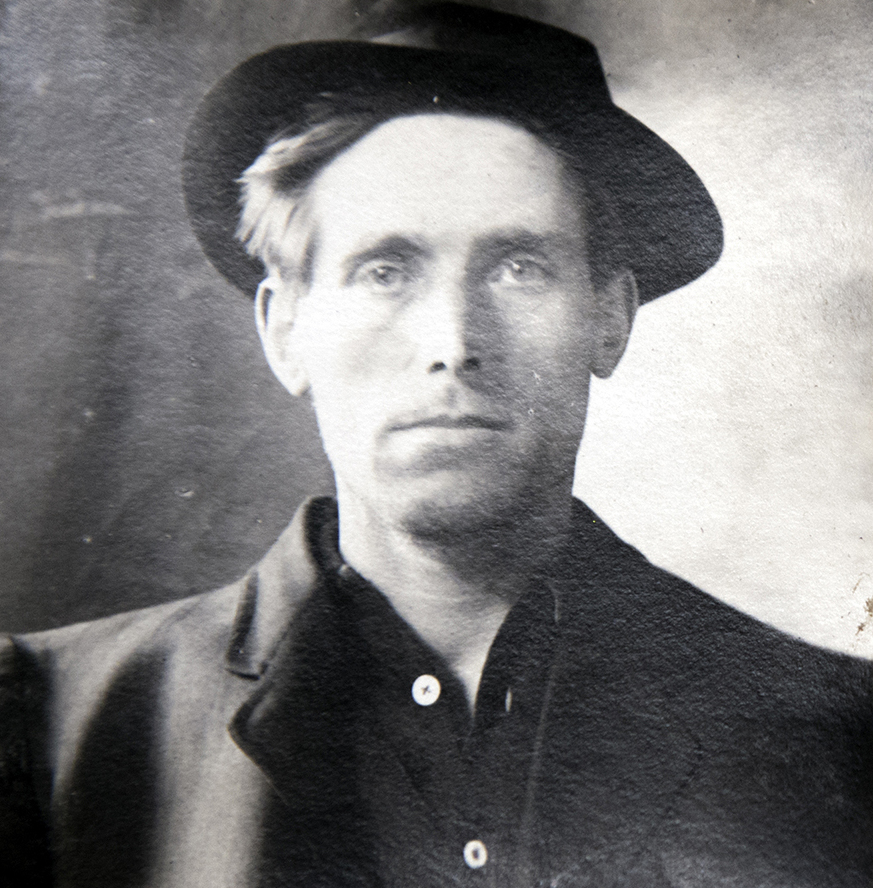After he was framed for a crime that landed him on death row in Utah, more than 10,000 letters from around the world urged his release.
He’s been the subject of numerous books, including a pioneering work of fictionalized biography by Wallace Stegner.
He’s not only the most famous troubadour of labor radicalism, but also inspired one of its most beloved and memorable songs, with numerous covers by artists including Paul Robeson, Joan Baez, and Bruce Springsteen.
But the life of labor radical and folksinger Joe Hill remains shrouded in mystery, as playwright Anthony Wood learned in writing Joe Hill: A Song of Protest, receiving a World Premiere Wisconsin production in Fond du Lac that opens next Friday under longtime collaborator Chris Flieller’s direction.


Under the auspices of Chris and Jane Flieller’s much-missed In Tandem Theatre in Milwaukee, Wood had already debuted the bawdy and wildly popular A Cudahy Caroler Christmas when the Fliellers approached him about a very different project: a serious play about the life and times of Swedish-born American radical Joe Hill.
“It was Jane’s idea,” Chris said, during a Zoom interview with him and Wood. “She’s a second-generation Swede, so she knew about Hill.”
“Chris and Jane asked me to set aside my fart jokes and write a serious play about Hill for an international cultural festival,” Wood recalled, referring to Milwaukee’s now-defunct International Arts Festival, an annual midwinter celebration focusing each year on the culture of a different part of the world.
Wood leaned on a couple of biographies and the still-available Little Red Songbook, which gathers lyrics by Hill and other folksingers, usually set to familiar hymns and popular songs, to take down organized religion, capitalist fat cats, and union scabs while praising working men and women and imagining a utopia in which they’d rule the world together.
“We had a good audience, with a lot of union people, for the International Arts Festival reading,” Flieller said. “But then we got busy with other things and put it to bed.”
That was 20 years ago. Then World Premiere Wisconsin was born.
“Last winter, with World Premiere Wisconsin on the horizon, Chris approached me about taking another look at the script,” Wood said. “He was already starting to think about adding the theatrical elements that would allow it to live on stage. I went back through it; now it’s just a matter of a director and actor making the discoveries they always do during rehearsal.”


A Riddle Wrapped in a Mystery Inside an Enigma
Even as he sketches the scant details of Hill’s hardscrabble Swedish childhood, emigration to America, and growing radicalization as he worked odd jobs throughout the United States, Wood makes clear from the very beginning of his play that “Joe Hill’s life was nothing but a series of secrets wrapped in secrets . . . wrapped in silence.”
What we do know is that he was an organizer for the International Workers of the World (known as the “Wobblies”), a radically anti-authoritarian trade union movement involved in repeated clashes pitting workers against both capitalist bosses and violent police forces bent on protecting the rights of property rather than upholding the peace.
Hill’s organizing eventually took him to Utah; less than a year later, he was arrested for the alleged robbery and murder of a Salt Lake City grocer and his son. He had an alibi involving a woman and a rival in a romantic triangle; to protect them, he refused to disclose their names.
Following a trial which biographers have described as barely legal and clearly unfair, Hill was sentenced to death; despite pleas from around the world and even from President Woodrow Wilson for clemency, Hill was executed by firing squad in November 1915.
“The main thing the state had on Hill was that he was a Wobbly and therefore sure to be guilty,” wrote Orrin N. Hilton, the lawyer who handled Hill’s unsuccessful appeal.
Subsequently discovered evidence – including a contemporaneous letter written by the woman whose name Hill wouldn’t reveal – confirms his innocence. But while Wood’s play draws on trial transcripts and takes us into the courtroom, his focus is elsewhere.
Along with Hill’s trial defense counsel, Wood wonders why Hill wouldn’t flesh out the alibi that could have saved his life. Did Hill stay silent because he figured he’d be more useful to the labor movement as a dead martyr than as a living organizer?
“Hill played the role of martyr to the hilt,” writes Melvyn Dubofsky in his authoritative 1969 history of the Wobblies. “The more a protest movement of international proportions urged the governor of Utah and the president of the United States to spare his life, the more the condemned man relished the attention.”
William M. Adler concurred in his 2011 biography of Hill, The Man Who Never Died: The Life, Times and Legacy of Joe Hill, American Labor Icon. Even as Adler sums up the overwhelming evidence of Hill’s innocence, he concludes that Hill came to see himself as worth more to the labor movement dead than alive.


Martyr With a Cause
“I was interested in what we are willing to sacrifice to keep a memory or a cause alive,” Wood said, in describing the “hook” that might transform a “history class” into a compelling play.
“In a very Christ-like way, Joe Hill became a martyr whose death gave life to a movement,” Wood continued. “I’m not a religious person, but I’m fascinated by how and why myths are generated. What are we willing to sacrifice for a larger idea? And is a person’s willingness to make that sacrifice brave? Or is it naive?”
In his play, Wood suggests that the Wobblies were well aware of how useful Hill’s death could be; like the state of Utah that murdered Hill, organized labor was able to use his death to teach a lesson by telling a story.
On the union side, the story that grew up around Hill included a paraphrase of his final jail cell communication to Wobbly leader Big Bill Haywood: “Don’t mourn. Organize.” Most famously, Hill’s legacy included “I Dreamed I Saw Joe Hill Last Night,” the 1936 song in which Hill remains as “alive as you and me” while insisting that he “never died” and never will.
The very existence of Wood’s play – whose more than two dozen characters will be presented by a cast of 13, drawn from UW-Oshkosh as well as the greater Fond du Lac community – seems to prove up Hill’s intimation of immortality.
But Joe Hill simultaneously deconstructs the legend of Joe Hill. Letting us glimpse the man behind the myth – and honestly grappling with how little of that man’s story we’ll ever really know – Wood challenges us to think about how and why we build the stories we tell.
Are we trying to tell the truth? Or are we trying to shape the facts in our own image and for our own ends?
Every writer must wrestle with such questions; one of the many strengths of Wood’s play is the baked-in tension resulting from his effort to tell us a compelling story about Hill’s life while simultaneously casting suspicion on the many storytellers – Hill himself concluded – who hastened Hill’s death.
In resisting and subverting the narrative undertow that makes Joe Hill an immortal symbol rather than a flesh-and-blood human, Wood’s play fights hard for Hill’s life. His Joe Hill isn’t a monolith. He’s a man.
Flieller isn’t wrong when he insists that “if you don’t know Hill’s story, you owe it to yourself to see this show and learn about a seminal moment in American history.”
But perhaps the very best reason to see Wood’s play involves all it tells us of the way that American history gets manufactured, and why.
“Histories of nation-states are stories that hide the seams,” historian Jill Lepore writes in This America: The Case for the Nation (2019). Conversely, plays like Joe Hill reveal them, helping us stitch together a quilt that more truly represents the competing, multi-colored stories making us who we are.
Read More
Little Red Songbook by Gary Blanchard
The Man Who Never Died: The Life, Times and Legacy of Joe Hill by William Adler
This America: The Case for the Nation by Jill Lepore


Joe Hill: A Song of Protest opens on Thursday, April 20 and runs through Sunday, April 30 at The Prairie Theater, 400 University Dr. in Fond du Lac. For more information, visit https://worldpremierewisconsin.com/event/joe-hill-a-song-of-protest-2/.



